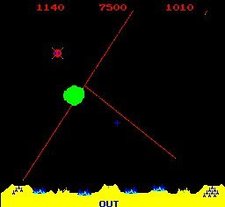Missile Command
|
|
| Missile Command | |

| |
| Developer: | Atari |
| Publisher: | Atari |
| Game designer: | Dave Theurer |
| Release date: | 1980 |
| Genre: | Retro/Fixed Shooter |
| Game modes: | Up to 2 players, alternating turns |
| Cabinet: | Standard, cabaret, cocktail, and cockpit |
| Controls: | Trackball; 3 buttons |
| Monitor | |
| Orientation: | Horizontal |
| Type: | Raster, standard resolution |
| Notes | |
| Developed during the Golden Age of Arcade Games | |
Missile Command is an arcade video game released by Atari in 1980. It was an immensely popular money-maker for Atari, with many units around the world still outperforming contemporary machines' revenue as late as the mid 90s. The plot of the game is brutally simple: your country is being attacked by an endless hail of ICBMs and as a regional commander of three anti-missile batteries, you must defend six cities in your zone from being destroyed. The game is played by moving a crosshair across the sky background image via a trackball and pressing one of three buttons to launch a counter-missile from the appropriate battery. The game only ends when all six cities have inevitably been wiped out. Like most early arcade games, there is no way to 'win'; it goes on theoretically forever with ever faster and more prolific incoming missiles, until it becomes humanly impossible to stop them all. The game, then, is just a contest in seeing how long the player can survive.
Missile Command is considered one of the great classic video games from the Golden age of arcade games. The game is also interesting in its manifestation of the Cold War's effects on popular culture, in that the game features an implementation of National Missile Defense and parallels real life nuclear war which is also impossible to win due to the Mutually Assured Destruction doctrine. In some sense the game is rather demoralizing, since it does not matter if you block 10 missiles or 10,000; the 10,001st one obliterates your home town just as easily as the 11th. For this reason, the game was known to have a powerful effect on some of its players with frequent reports of people having nightmares of nuclear holocaust after extended play.
| Contents |
Ports
Like most top-grossing arcade hits, Missile Command was ported to the Atari 2600. In later years, it was ported to several other systems, such as the Lynx and Gameboy.
A5200_Missile_Command.png
Having just acquired the Atari label, Hasbro Interactive released a Microsoft Windows and Sony PlayStation version in 1999, but didn't sell well. Hasbro Interactive released a series of Atari classic remakes around the time, most of which quickly found their way to the discount bin.
Legacy
In 1982 a multi-player sequel was planned but never released. This game would have been identical to the first except with twice as many cities and batteries and the players cooperating to save each other's cities from the onslaught.
In 1992 Atari developed a prototype of an arcade game called Arcade Classics for their 20th anniversary. The game that included Missile Command 2 and Super Centipede (an updated version of the original Centipede).
There is an open source/SDL version of Missile Command called Penguin Command, and an Amiga clone.
Trivia
In Terminator 2: Judgment Day, John Connor is seen playing the game in a video arcade where the T-1000 shows up. The game was also part of the film's theme: a nuclear holocaust.
See also
External links
- The Killer List of Video Games entry on Missile Command (http://www.klov.com/game_detail.php?letter=M&game_id=8715)
- The MobyGames' entry on the home versions of the game (http://www.mobygames.com/search/quick?q=missile+command)
- Penguin Command (http://www.linux-games.com/penguin-command/)
- Arcade History Database enty (http://www.arcade-history.com/history_database.php?page=detail&id=1644)
- Category at ODP (http://dmoz.org/Games/Video_Games/Shooter/2D/Missile_Command/)
- An excellent Missile Command game coded in C# (http://netfiles.freespaces.com/remakes.htm)
